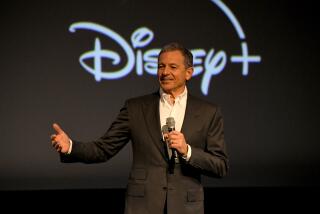Feud at Disney Ends Quietly
- Share via
Walt Disney Co.’s incoming chief executive and its leading rebel shareholder declared a truce Friday, the most dramatic sign yet that the new boss is committed to sweeping aside the ill will that festered under outgoing CEO Michael Eisner
The agreement between Robert A. Iger, the new chief, and Roy E. Disney brings to a close one of the nastiest executive-suite dogfights in recent corporate history, one that led last year to Eisner being stripped of his chairmanship.
Disney and longtime lieutenant Stanley P. Gold, both ex-directors, agreed to drop a lawsuit alleging that the selection process leading to Iger’s promotion was “a sham.” In return, Roy Disney will be given the honorary title of director emeritus, a post that carries no voting power or rights to attend board meetings.
Regarded by many Disney loyalists as the caretaker of his uncle Walt’s legacy, Roy Disney also will be given a consulting contract and an office on the company’s Burbank lot.
The entertainment giant took note of Roy Disney’s “longtime devotion” to the company. Gold and Disney, for their part, expressed confidence in Iger’s leadership and gave a nod to Eisner’s contributions to the company.
The pact came on the heels of Iger’s dismantling of Disney’s powerful strategic planning department, widely viewed by upper management as Eisner’s tool to exert control over virtually every aspect of the Disney empire. Iger, who was named CEO-elect in March after serving as Eisner’s second-in-command, was applauded inside the company for acting swiftly to resolve a situation that was hurting executive morale.
Although he does not formally take the reins until Oct. 1, Iger is silencing critics who said he lacked the backbone to steer a new direction for a company over which Eisner had cast an imposing shadow. During his 21-year tenure, Eisner was lauded for his creative decisions but criticized for letting personal feuds interfere with the operation of the company.
As part of his drive to set a new tone for Disney, Iger already is making overtures to Pixar Animation Studios Chairman Steve Jobs, whose strained relationship with Eisner contributed to a breakdown in talks to keep alive the lucrative partnership behind such computer-animated hits as “Finding Nemo” and “Toy Story.”
Friday’s agreement was disclosed in a one-paragraph statement, closing with a notation that none of the parties would comment further -- an almost anticlimactic conclusion to a saga that rocked the world’s most famous entertainment company.
Gold and Disney, after quitting the Disney board in 2003, launched a fierce grass-roots effort to force the ouster of Eisner, who they alleged had mismanaged the company. Their efforts resulted in a stunning 45% no-confidence vote for Eisner at the company’s 2004 annual meeting in Philadelphia, prompting Disney directors to remove him as board chairman and setting in motion his pending retirement.
But the fight didn’t end there. The two ex-directors, who had dismissed Iger simply as Eisner’s understudy, sued board members in May. Gold and Disney alleged that Iger’s selection as CEO was engineered by Eisner and did not, as promised, include a thorough search. Relying on that promise, Gold and Disney said they refrained from running their own slate of directors at the company’s annual meeting in February.
The lawsuit had been set for trial Aug. 10. According to one source close to the company, directors believed they would prevail but feared that a trial would be a potentially embarrassing distraction, generating the kind of bad press that accompanied a shareholders suit last year over Eisner’s ill-fated hiring and firing of former Disney President Michael Ovitz. A decision on that case is expected soon.
Although Iger’s latest move was greeted enthusiastically on Wall Street, some investor representatives were surprised that Gold and Disney surrendered on an issue about which they had expressed such strong feelings.
“I’m kind of at a loss to explain this given the strong nature of the rhetoric concerning Bob Iger in the past,” said Patrick McGurn, executive vice president of Institutional Shareholder Services, which advises large stockholders. “It’s as though they’ve gone from 60 miles per hour to zero in 4.2 seconds.”
Disney and Gold’s fight had been losing momentum as the company’s performance continued to improve. Iger’s selection drew plaudits from many investors and analysts, who credit him with turning around Disney’s ABC television network.
According to three sources with knowledge of the situation, Iger spoke to Disney and Gold on several occasions in an effort to broker a peace. While Iger was looking to end the feud, one of the sources said, Roy Disney had grown weary of the fight and was seeking a graceful resolution that would allow him some role -- if only symbolic -- at the company that bears his family name.
Roy Disney practically grew up on the company’s Burbank lot. As a boy, his uncle ran ideas by him, including a plan for a film version of “Pinocchio.”
Wall Street analyst Harold Vogel, echoing the view of other analysts and media executives, said Iger’s recent moves demonstrated that he was ready to step out on his own.
“He dismantled the strategic planning department, which was Disney’s biggest internal problem,” Vogel said. “And now by settling with the dissidents, he’s bringing an end to their main external problem and a major distraction.”
Shares of Disney rose 55 cents Friday to $25.
More to Read
The biggest entertainment stories
Get our big stories about Hollywood, film, television, music, arts, culture and more right in your inbox as soon as they publish.
You may occasionally receive promotional content from the Los Angeles Times.











